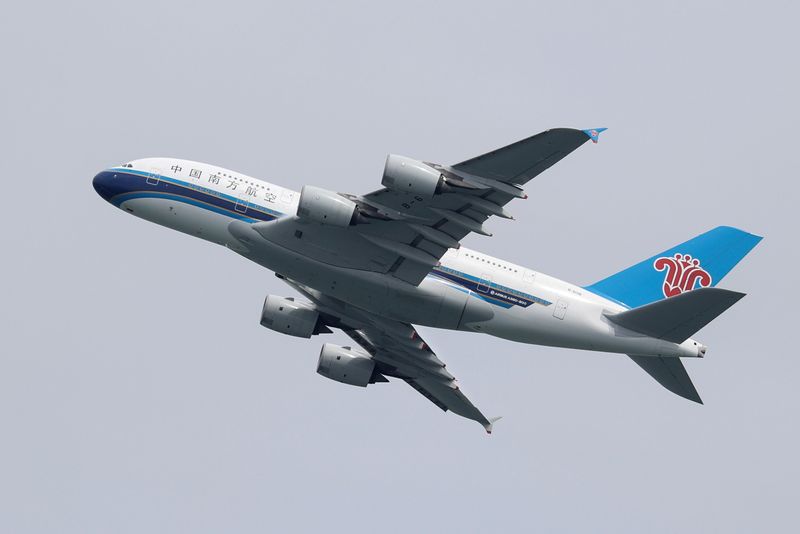By Stella Qiu and Jamie Freed
BEIJING/SYDNEY (Reuters) - China's three biggest airlines on Friday posted wider third-quarter losses than in the previous quarter as a resurgence of local COVID-19 cases drove a sharp decline in domestic travel and international borders remained closed.
The losses highlighted one of the consequences of the country's policy of seeking to eliminate COVID-19 within its borders. Each time there is an outbreak, flight numbers fall sharply before rebounding once cases are controlled.
The fourth quarter is facing similar though so far less severe issues. This week's scheduled airline capacity in China is 4.8% lower than last week because of minor outbreaks, according to data firm OAG.
Beijing-based Air China (OTC:AIRYY) Ltd, the country's flagship carrier, said its net loss attributable to shareholders rose to 3.5 billion yuan ($547 million) in the third quarter from 578 million yuan in the second quarter, taking the nine-month net loss to 10.3 billion yuan.
China Eastern Airlines (NYSE:CEA) saw its net loss grow to 3.0 billion yuan from 1.4 billion yuan in the second quarter. The total loss to shareholders amounted to 8.2 billion yuan in the first three quarters.
China Southern Airlines widened its loss to 1.4 billion yuan from 682 million yuan in the second quarter for a nine-month total shortfall of 6.1 billion yuan.
The Guangzhou-based carrier said it aims to replenish its capital by raising up to 4.5 billion yuan via A-share private placement and HK$1.8 billion via H-share private placement.
A resurgence of COVID-19 cases since late July involving local airports and tour groups has been a substantial setback to the domestic travel market.
China's air passenger traffic dropped 51.5% in August from a year ago, before recovering to a decline of 24.7% in September, official data showed. The Civil Aviation Administration of China (CAAC) has said it is studying more measures to help airlines financially.
The lacklustre state of the travel market has also led some Chinese airlines to roll out "all you can fly" promotional deals in the past few weeks to stimulate demand.
With the Chinese market tepid, there appears to be little urgency for the CAAC to certify Boeing (NYSE:BA) 737 MAX planes, which it grounded more than two years ago over two fatal crashes.
Sources told Reuters that chances are growing that Chinese certification will slip to next year.
Boeing executives said in an earnings call on Wednesday that a third of about 370 undelivered MAX airplanes in storage are for Chinese customers and that the company hopes to resume deliveries in China in the first quarter of next year.
Airbus Chief Executive Guillaume Faury said on Thursday there had been "ups and downs" in deliveries to China depending on the country's COVID-19 situation and willingness of customers to travel to pick up their planes.

"We've had some challenges in September from that perspective," he told analysts.
($1 = 6.3963 Chinese yuan renminbi)